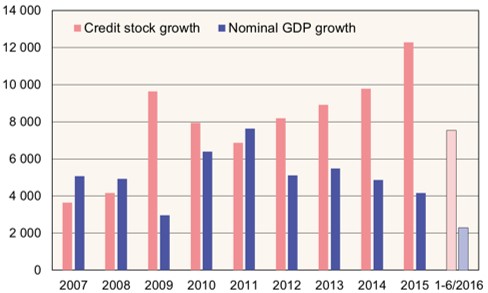BOFIT Weekly Review 33/2016
China’s credit expansion creating less and less economic growth
Financial circles are increasingly worried about China’s soaring indebtedness in the face of faltering economic growth. China’s credit stock grew 15 % y-o-y the first half of this year, then slowed slightly to 13 % y-o-y last month. At the end of July, the value of yuan bank loans in China climbed to 102 trillion yuan, or about 144 % of GDP.
Using the Chinese central bank’s broadest credit measure (total social financing, TSF), the credit stock in July was up 12 % y-o-y to an equivalent of about 210 % of GDP. Indicators of activity in the shadow banking sector suggest that the use of banker's acceptance bills has fallen significantly this year, while the stock of trust and entrusted loans has increased (up 17 % y-o-y in July). Among the various TSF categories, the stock of corporate bonds grew fastest (up 30 % y-o-y at the end of July). The money raised by companies through equity issues has also increased rapidly this year.
A highly disconcerting aspect of China’s rising indebtedness is the fact that companies are devoting an ever-increasing share of new borrowing to servicing existing debt. There are also signs that borrowed money is going elsewhere than investment in production in hope of quicker returns. Last year, the stock of yuan-denominated loans grew by 12 trillion yuan, which was roughly three times more than the growth of nominal GDP. The ratio has persisted this year as well.
Annual growth of credit and GDP in China, CNY billion

Sources: Bloomberg, CEIC & BOFIT